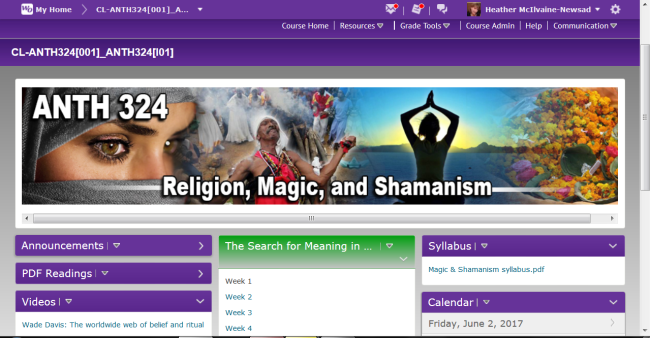You have /5 articles left.
Sign up for a free account or log in.

Western Illinois University
Rarely a day goes by without the announcement of a new online academic program at one college or another. Most of them are master's degrees, and the fields are pretty predictable: data science, health administration, cybersecurity, business. Disciplines in which jobs are plentiful, and student demand, therefore, presumably high.
Which is why the recent announcement that Western Illinois University would begin offering an online bachelor's degree in anthropology caught our eye here at Inside Digital Learning.
Anthropology? The major that Florida's governor famously trashed a few years ago, saying the state didn't need any more residents with degrees in the discipline? That regularly shows up on (arguably oversimplified) lists of "least valuable" majors?
As Heather McIlvaine-Newsad, a professor of anthropology at Western Illinois, put it: "Very few jobs say 'anthropologist wanted.' "
Let's be clear: Western Illinois does not expect its new online anthropology degree to "save the university's enrollment," said Jeff Hancks, its director of distance learning. (The university's total enrollment has tumbled by nearly a quarter since 2012.) But while administrators at Western Illinois, as at many universities, are very much looking for high-demand or marketable online programs that can help supplement sagging state support, that's not the only reason an institution might start a new digital program.
This one came entirely from the ground up, from a small cadre of passionate faculty members who thought they might be able to bring the curriculum they've created to a few more students and draw a few more majors to a discipline they believe in.
"It's really refreshing for us to see a department come together and try something like this," Hancks said.
Anthro for the Many
For McIlvaine-Newsad and Western's other anthropologists, this is a project born of love.
She said she was "privileged" enough to get a strong liberal arts education at a small private college (Denison University), and it was her undergraduate minor in sociology and anthropology that "taught me to think critically" and "formed the foundation for the way in which I view the world, the choices I make about things."
So she was among a small cadre who helped Western Illinois create a new anthropology major in 2009, hoping to "offer that kind of small, intensive critical thinking major to public university students," especially the many students at Western who are first in their families to go to college. "This kind of opportunity wasn't available to them elsewhere at other public universities," she said.
The major remains bare bones (five faculty members) and comparatively small – it has grown from nine in its first year to a high of 23 2013, and is at 20 now.
But because the cadre of anthropology instructors are scrappy and creative – Hancks said Western's anthropologists are "known for being creative, forward-thinking" – they have in recent years made most of the department's courses available online.
"It really wasn't a big leap for us; we've been so resource stricken, all of us were already using a lot of digital elements even in our face-to-face courses," McIlvaine-Newsad said, mentioning Periscope to communicate with students and a platform called Unleesh to engage with students studying abroad.
"Given the constraints of where we live, where we're in the middle of a cornfield, we try to take students to the Field Museum in Chicago, but that's once a year," she says. Digitizing the classes has been most challenging, she said, for the department's physical anthropologist, who has had to depend on 3-D models instead to look at the biological body "instead of being able to take somebody to the lab to show them something."
Online Courses = More Students
As courses moved online, enrollments have followed. When McIlvaine-Newsad taught her course on "Religion, Magic and Shamanism" last fall, 15 students took the course in person -- and roughly twice as many online. Some of the online students study physically at the university's Quad Cities campus near the Iowa border, and others are enrolled in Western's adult-serving program, the Bachelor of Arts in General Studies.
Given how many courses had moved online for practical reasons, making the leap to a fully online anthropology program -- the first such degree in Illinois, and one of only a couple of handfuls nationally -- required digitizing only three more classes.
The expectation is that the online degree will "multiply our majors and minors," McIlvaine-Newsad said. Department officials hope to convert some students who are already taking individual online courses into majoring in anthropology, and to draw new students as well.
And if it works, said Hancks, the director of distance learning, Western Illinois might seek to replicate the success. Most of its existing online degree programs (all at the master's level, though students can complete 18 minors online) have been built in "niches where we think we can serve a market X or Y program," he said.
"But we've been thinking about ways we can offer more traditional majors in that format, too," he said. The anthropology department's experiment "doesn't really cost us anything, and we'll give it a go. And if it works, it could be a model for us to start looking at traditional core majors [online], rather than the trendy."





